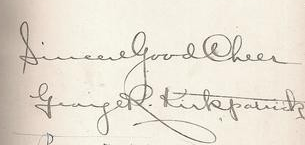Friday, June 21, 2019
George Ross Kirkpatrick
George Ross Kirkpatrick, February 24, 1867 (West Lafayette, Ohio) – March 23, 1937 (San Gabriel, Calif.)
VP candidate for Socialist Party of America (1916)
Running mate with nominee: Allan L. Benson (1871–1940)
Popular vote: 590,524 (3.19%)
Electoral vote: 0/531
The campaign:
No convention was held in 1916. With Eugene Debs deciding not to run for President, Benson and Kirkpatrick were nominated by referendum via the mail by SPA members. Although the Party was a house divided on many issues, one stand that united the Socialists was the belief that the war overseas was not an American war but a war of European capitalists. The more damaging SPA divisions would come later, when the US entered the Great War in 1917.
Although the election results were not as stellar as the previous election, they still had a respectable third place showing. Their top states: Oklahoma (15.55%), Nevada (9.20%), Florida (6.63%), Wisconsin (6.18%), Idaho (5.99%), Washington (5.98%), Arizona (5.47%), Montana (5.38%), Minnesota (5.19%), and Texas (5.09%). They continued to hold steady with winning offices at the local level. This election would be the end of an era for American socialism.
Election history:
1928 - US Senate (Ill.) (Socialist Party of America) - defeated
1932 - US Senate (Calif) (Socialist Party of America) - defeated
1934 - US Senate (Calif) (Socialist Party of America) - defeated
Other occupations: author, teacher, editor
Buried: ?
Notes:
Known as "Kirk"
His opponent in the 1934 Senate race was 1912 Progressive Party VP Hiram Johnson.
Joined the Socialist Party of America in 1903
Best known for his 1910 anti-militarism book, War — What For?
Allied himself with the "Old Guard Faction" in the Socialist split of 1934 and then left the Party.
"Nature gave men two ends - one to sit on and one to think with. Ever since then man's success or
failure has been dependent on the one he used most."--George Ross Kirkpatrick
Divorced and remarried in 1926.
Gave lectures on the prohibition of alcohol in the 1890s.





